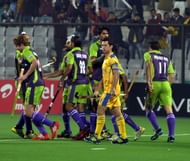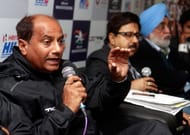Here are a few stray thoughts and observations about the ongoing Hockey India League, some in relation to the rival World Series Hockey held last year and some relating to hockey in general:
1. A Tale of two leagues
The paid functionaries of the HIL (some of whom were associated with the WSH earlier) are going bananas and calling it “the world’s best league” and the like, just like contracted employees of the WSH were dubbing it the best or “biggest” hockey league in the world or “a tournament of international calibre, featuring the world’s best players”.
One anonymous blogger on ‘Malaysian Hockey’, incensed with the exclusion of the Pakistanis from the action, had this to say about the issue while pointing out various technical shortcomings in the conduct of the championship: “Far from being the best ever league in the world, it is now remarked as the four and the half countries league or even more sinister, is it being called the Australian Development League….”
No doubt, the HIL has some of the world’s best contemporary foreign and Indian players on the bill as compared to the WSH, who were forced to field a second string of both varieties. But surely, the German and Dutch leagues, where a fair compliment of foreigners ply their trade, including a few from India, will be better placed to make such a claim, considering these countries figure at Nos. 1 and 3 in the FIH rankings while we are stuck at a lowly 11. Anyway, only if an HIL team wins the Champions League for clubs, as in football or T20 cricket, can the claim to be the best hockey league in the world be validated, though this premise is also open to debate.
2. The real riches
The mouthpieces of the HIL have gone gaga over the grand prize money announced by the promoters, which is Rs. 2.5 crore for the winners, Rs. 1.25 crore for the runners up and Rs. 75 lakh for the third placed team. This of course is much less than what the WSH had put up, which was Rs. 4 crore for the champions and Rs. 2 crore for the runners up out of a total purse of Rs. 10 crore.
The moot point is, will the booty be shared between the players and officials of the winning team and others, or will it be entirely pocketed by the franchise owners who are footing the bill for their respective outfits? Going by the experience of players from the winners (Sher-e-Punjab) and runners up (Pune Strykers) of the WSH, they may not even get a whiff of the money. Nimbus, promoters of the WSH, claimed they paid up the prize money to the franchises, who may have kept it all for themselves – now that depends on what the contract says, as the players were presumably paid their contracted salary.
Also, are the individual awards for man-of-the-match, best goal, player-of-the-tournament being shared by teammates, whatever the proportion, as they should be? Take Sandeep Singh, for example, the leading scorer in the HIL so far. If he gets the highest scorer of the tournament prize, will he share it with the ejector and the stopper and also his colleagues, who make dummy moves at the sides while taking the Penalty Corners? Did Gurjinder Singh, the star of the WSH, share his individual prize money with his colleagues – provided he or the franchise received all of it?
3. Rise of the Indian coach?
India’s ranking is an insignificant 11th in world hockey as mentioned earlier, but the only Indian coach (A K Bansal) in the HIL has outclassed his more illustrious foreign counterparts with Delhi Waveriders topping the charts for quite a while – even if he does not go on to win the tournament as that will depend on the team’s form on the day. It must be remembered that the inaugural WSH was won by an Indian coach, Rajinder Singh, though there were three reputed foreign coaches (out of eight) in the fray there. So, will Indians be invited to coach in the West in greater numbers because of this development (former national coach Cedric D’Souza , a TV pundit at HIL, is the rare Indian who is a regular on the coaching circuit in Europe)?
4. Mumbai‘s miseries
Why has the Mumbai franchise been the non-performer in both leagues? In the WSH, Mumbai Marines finished last out of eight teams, with 13 points from 14 games and nine defeats. Mumbai Magicians now are languishing in last spot in the HIL after eight rounds. The Marines too were coached by an Australian, the highly accomplished Andrew Meredith, assistant coach to the 2012 Olympic gold medal winning German national team, though he was not around in between due to his national commitments.
Incidentally, can the Magicians script a magical turnaround like the Karnataka Lions did in the WSH and at least reach the semi-finals?
5. Unlucky Charlesworth
Spare a thought for Ric Charlesworth who seems to be mostly bereft of luck. As a redoubtable player in a redoubtable team, he could not win an Olympic gold, though he did manage one in the 1986 World Cup. As a coach too, he won the 2010 Men’s World Cup but could not repeat the feat at the 2012 Olympics as men’s coach, though he has won Olympic gold twice as coach of the Hockeyroos. Perhaps his time will come in 2016!
6. Sandeep Singh’s second coming
Spare a thought for Sandeep Singh too. He is the leading scorer in the HIL by a mile – 11 goals and counting. It must be noted that all other franchises except Mumbai have foreign goalkeepers from among the leading teams in the world, so the penalty corner exponent’s feat is rather special. It must however not be forgotten that Sandeep was a flop at the London Olympics 2012 and could score only 2 goals while being prolific in the Olympic qualifiers against lesser teams earlier. Will his new-found form help him regain his place in the national team or will the fact that Mumbai have conceded the maximum number of goals (as of now), prejudice Michael Nobbs’ mind against his recall?


